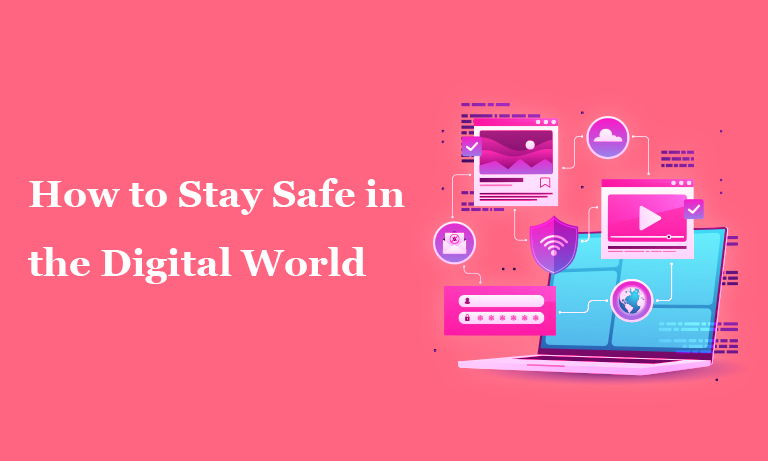To this point, the internet is an integral portion of countless distributions, linking us nearer in the direction of statistics, entertainment and dialogue. But with access to more digital platforms comes greater need for robust online security. Digital safety is becoming a priority for everyone as cybercriminals, hackers, and data breaches become increasingly sophisticated.
In this guide, we’ll discuss how to stay safe in the digital world, the best cybersecurity practices, and outline some online security tips to protect your personal information from a cyber threat.
What is Digital Safety?
Digital safety is all about protecting your personal data, your privacy, and your devices from cyber threats such as hackers, malware, and scams. From social media and online shopping to sensitive work information, internet safety tips help you protect your online identity.
Why are Online Security Important?
Millons of cyber attacks are carried out daily if you’re not following cyber security tips can lead to:
- Identity theft :– Cybercriminals can obtain your personal information and use it for fraudulent purposes.
- Financial loss :– Poor security can lead to your bank account and credit card numbers being at risk.
- Invasion of privacy :– Your private, emails and social media can be accessed by hackers.
- Data breaches :– Hacked accounts can get breached, accessing personal or business information.
If you use the right online privacy protection methods then the level of cyber crime that you are susceptible too drastically decreases.
5 Digital Safety Rules You Need to Always Follow
Here are five crucial rules to protect yourself in the digital world:
Use Strong Passwords & 2-Factor Authentication
- Always create strong passwords with 12+ characters (upper, lower, number, symbol).
- Don’t use obvious passwords, such as “123456” or “password123.”
- Turn on two-factor authentication (2FA) on all accounts for added protection.
Stay Alert To Phishing Scams & Fake Websites
- Avoid clicking on emails, links, or attachments that look suspicious.
- Always confirm if the site you are filling your details into is real.
- Check for websites beginning with “HTTPS” and a padlock symbol before entering sensitive details.
Keep Your Devices Safe & Update Software Regularly
- Run trusted antivirus and enable firewalls.
- Keep your operating system (Windows/macOS), apps, and browsers up to date to patch security vulnerabilities.
- Do not ever download files from unknown sources.
Control Personal Information on Social Media
- Refrain from indiscriminately sharing personal information, such as home address or phone number.
- Check privacy settings on Facebook, Instagram and other platforms.
- Don’t accept friend requests from people you do not know.
Secure Networks & Avoid Public Wi-Fi
- Avoid accessing bank accounts or entering passwords when connected to public Wi-Fi networks.
- Browse on public places with VPN (Virtual Private Network).
- When using shared or public computers, sign out of accounts.
How Can You Protect Yourself in an Electronic World?
In this connected e-world, ensuring you follow these best security practices will help keep you safe:
🔹 Be wary of downloads that seem suspicious: Cybercriminals can prey on people with malware disguised as free software.
🔹 Turn on device encryption: Encrypt your computer and phone for extra privacy protection online.
🔹 Established automatic back ups: We’d like to protect your documents against cyberattacks and out of mistake.
🔹 Use reliable payment gateways: Always make sure the platform is secure while purchasing on the internet.
🔹 Review bank statements: Look out for transactions you don’t recognize.
8 Ways to Protect Yourself from Hackers & Cyber Threats
Below are some techniques that hackers use to exploit users. Here’s how to protect yourself from hackers:
- Do not click on mysterious links or advertisements.
- Do not use the same password on different sites.
- Remember to log out from your devices by closing your browsers after using public/shared computers.
- Adjust social media account settings to private.
- Read up on typical scams, so you can identify fraud attempts.
The Future of Digital Safety
As technology advances, the other side of the coin, that is cyber threats will develop accordingly. Here are some predictions for impending trends in online security:
Artificial Intelligence in cybersecurity :— More and more of the threat detections are AI-based. Stronger encryption standards :— To keep sensitive data safe from cyberattacks.
Real time Biometric safety :– Fingerprint and face recognition in digital safety.
More complex fraud :– Awareness and cyber hygiene will be vital.
So to keep up with your safety that would all be the latest cybersecurity tips you find.
Conclusion
There are a number of opportunities in the digital world, but it comes with cyber threats as well. Using strong passwords, avoiding phishing scams game, securing your devices, and being careful with personal information are some of the internet safety tips you can follow to improve your safety in the digital world.
FAQ: Frequently Asked Questions About Digital Safety
How can I stay safe digitally each day?
- Never use the same password on another account.
- Use two-factor authentication (2FA)
- Don’t click on questionable links.
- Keep your software and antivirus up to date.
What are the commonest threats in the digital space?
- Phishing emails & scams
- Malware & ransomware
- Identity theft & fraud
- Data breaches & password leaks
How can I shop online as safely as possible?
- Shop only from trusted sites — or at least ones that use “HTTPS.”
- Pay with credit cards or protected payment methods like PayPal.
- Don’t store your payment information on public computers.
How can I shield my kids in the digital world?
- Set parental controls to restrict the access to harmful content.
- Teach them about online privacy & cyberbullying
- Check their social media activity.
- Educate them not to divulge any information with a stranger.
How to check if my personal data has been compromised?
Go to “Have I Been Pwned” (https://haveibeenpwned.com/) to check if your email was affected. Be wary of suspicious login attempts or fraud alerts. 🔍 If you think you’ve been hacked, change your passwords immediately.






